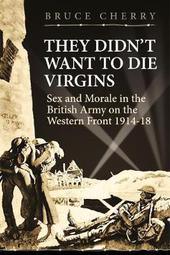
|
They Didn't Want to Die Virgins: Sex and Morale in the British Army on the Western Front 1914-1918
Hardback
Main Details
| Title |
They Didn't Want to Die Virgins: Sex and Morale in the British Army on the Western Front 1914-1918
|
| Authors and Contributors |
By (author) Bruce Cherry
|
| Series | Wolverhampton Military Studies |
|---|
| Physical Properties |
|
| Category/Genre | British and Irish History
First world war |
|---|
| ISBN/Barcode |
9781910777701
|
| Classifications | Dewey:940.40941 |
|---|
| Audience | |
|---|
|
Publishing Details |
| Publisher |
Helion & Company
|
| Imprint |
Helion & Company
|
| Publication Date |
31 January 2016 |
| Publication Country |
United Kingdom
|
Description
There has been a collective amnesia when it comes to recalling the sexual activities of the British soldier on the Western Front between 1914 and 1918. Perhaps there has even been a conspiracy of silence with some inclined to let sleeping dogs lie. That the soldier could find the time, inclination, and indeed partners to enjoy a sex life amidst the mud and carnage is often a revelation even to those who are Western Front experts. Yet, as official venereal disease treatment figures attest, many a man or boy - even those with wife or sweetheart at home - took every opportunity offered to satisfy their lust, or assuage their natural youthful curiosity. Sexual adventures took place in regulated brothels, with `wayside' prostitutes, and with compliant local women, themselves seeking the excitement of `wild love'. And the army not only turned a blind eye but effectively became a procurer as Edwardian morals were sacrificed for morale and the need to keep men healthy enough to die in the line. This meticulously researched study examines the soldiers' sex life in detail, exploring its impact on morale and placing it the context of both pre-war civilian morality and the army's historic policy on sex. The author has read between the lines of published and unpublished memoirs and letters; listened carefully to hundreds of memories stored at London's Imperial War Museum; analysed soldiers' songs and jokes; and reinterpreted contemporary paintings, magazine illustrations, postcards and cartoons, that unconsciously left visual evidence of the importance of sex. Recently discovered unique photographs are included to give weight to his argument. The men's attitudes as well as actions are examined, as is their ownership and use of pornography. Noting that it `takes two tango', the book looks at the socio-demographics and motives of the women involved and the workings and economics of the `Red Lamp' army-regulated brothels. Careful not to denigrate the memory of the men who served and died, and avoiding sensationalism, hyperbole, or tabloid-style copy, the author paints a vivid picture of the seedier aspects of line behind the front while arguing its positive impact on morale.
Author Biography
Bruce Cherry's varied career has included journalism, university lecturing and extensive international experience as a marketing consultant for the tourism and education industries. In-between, he somehow managed to find the time to pursue a passion for military history, gaining a PhD to add to Masters in business, and has been researching, planning and leading battlefield tours since the late 1980s. He was founder of several well-known battlefield tour companies. This rich experience is evident in both the book's content and the style in which he handles what might be considered sensitive material. When not leading battlefield tours, Bruce now divides his time between the UK and Brazil (where he has family) and manages to find time for listening to rock music and watching Manchester United.
ReviewsBruce Cherry has not become lost in his evaluation of this unusual and fascinating subject and this aspect of men at war which has, as far as I'm aware, never been evaluated in such depth and erudition - or has been so well illustrated and written. * Stand to! * This book is highly recommended, and is not just for readers of sexual history. It forms such a strong argument that future writers on motivation and morale in the British Army of the First World War who omit references to sex should be justly accused of scholarly myopia. * Journal of the Society of Army Historical Research *
|